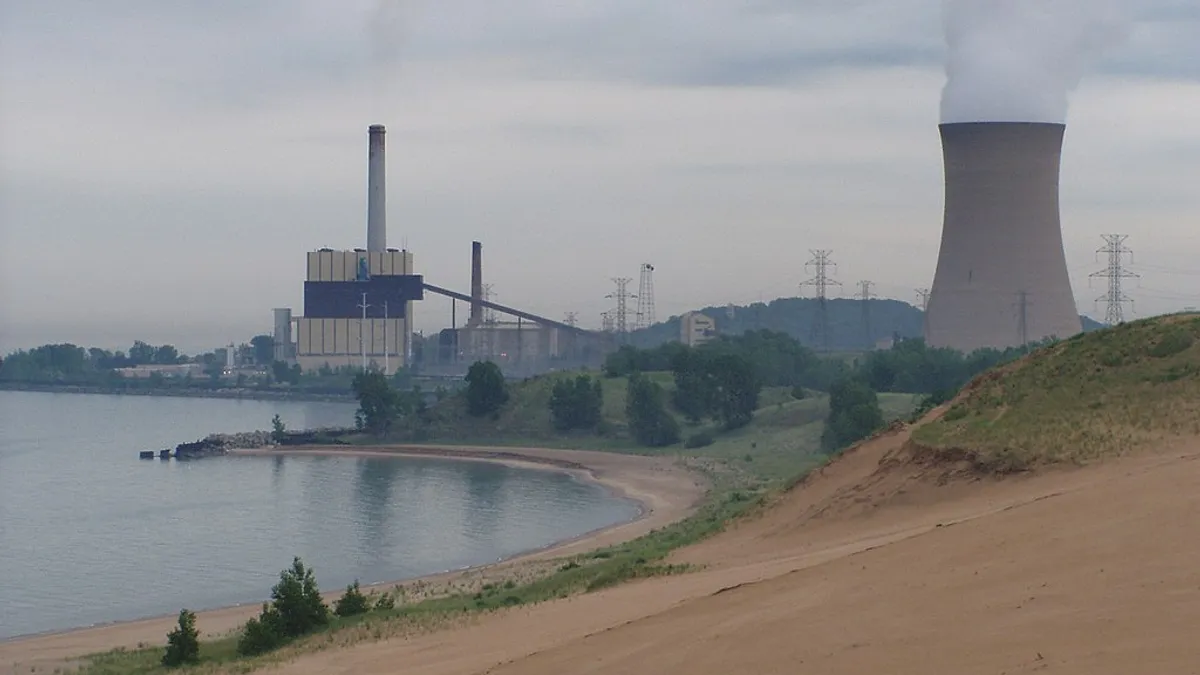Dive Brief:
-
Indiana lawmakers on Thursday defeated a controversial power plant moratorium aimed at preserving in-state coal generators, but the language could resurface later in the legislative session.
-
State lawmakers voted 53-38 to remove Amendment 7 from Senate Bill 472. The amendment would have halted utility purchases or construction of generation assets 250 MW or larger until 2021.
-
Debate over the generation moratorium corresponded with a lobbying campaign by out-of-state coal interests that supply fuel to Indiana generators, the Indianapolis Star reported. Utilities, which plan to retire their aging coal generators in favor of cheaper gas and renewables, have opposed the moratorium.
Dive Insight:
Defeat of the Indiana generation moratorium on Thursday night is a victory for the natural gas and renewable energy industries, which are set to see their responsibilities grow in the state as utilities retire coal plants.
However, multiple industry sources close to the negotiations warn that the language, inserted into a water utility bill last week, could resurface in other legislation soon, such as the state budget proposal.
The amendment, introduced by Republican Rep. Ed Soliday, would have directed the Indiana Utility Regulatory Commission (IURC) to not issue any final orders in proceedings that request the construction of new generation resources or the approval of a power purchase agreement until Jan. 1, 2021.
During that time, Indiana would convene an energy task force to study the reliability impacts of utilities moving away from coal for natural gas and renewables.
The moratorium would have initially applied only to power plants 250 MW or larger. But if the IURC approved more than 10 GW of generation capacity in "all matters or proceedings" before 2021, the size limitation would be lifted and the pause would apply to all generation.
Democrats in the Indiana legislature said they were on board with the energy task force, but questioned the need for the generation moratorium, which one senior party leader viewed as interference in IRUC.
"I think that it's problematic to reach into the utility decommission and basically tell them they have to stop doing things for an 18 month period," Representative Matt Pierce, the ranking member on the House utilities committee, said on the floor Thursday evening.
While coal interests in and outside of Indiana supported the moratorium, Soliday said Thursday that the pause was necessary to ensure Indiana consumers are protected from potential utility over investment in large gas generators as the price of renewable energy continues to drop.
"The cheapest energy we have in Indiana today is wind coming out of the Dakotas. It's just the pipe to get it out of there is a little small," Soliday said. "We need to have a policy that is balanced that says let's not transition into hugely expensive forms of energy that we may pay for for 40 years when something new like renewables may be cheaper."
Soliday called out the integrated resource plan filed last year by the Northern Indiana Public Service Corp., which aims to retire its coal plants early and transition to more wind, solar and batteries.
"They're going to produce 40% less generation and they're going to buy a lot from MISO," Soliday said. "Is that good or is that bad? We don't know. That is the point of the study and the point of the task force."
Most legislators, however, agreed with Pierce that the moratorium was unnecessary. Republicans hold a 67-33 supermajority over Democrats in the state House, but a number crossed the aisle to vote against the Soliday amendment.
A concerted lobbying effort by coal interests to counter Indiana's energy transition may mean the battle could resurface in the coming weeks. Various coal groups, including the Energy Policy Network, Indiana Coal Council and others, have targeted utility plans to retire coal plants in recent months, according to the Star.
If NIPSCO's coal plants do not close early, Wyoming coal producers could supply "an additional 16 years, 15.3 million metric tons of [Powder River Basin] coal," the head of EPN told a coal conference last month, according to the paper.
In addition to NIPSCO, utility Vectren Corp. last year unveiled a $900 million plan to retire four coal plants by 2023 and build a new gas plant.
NIPSCO began executing its clean energy strategy last month, finalizing agreements with developers for 800 MW of wind energy. Those projects and an upcoming request for proposals for clean energy from the utility could be jeopardized if the moratorium language resurfaces.













